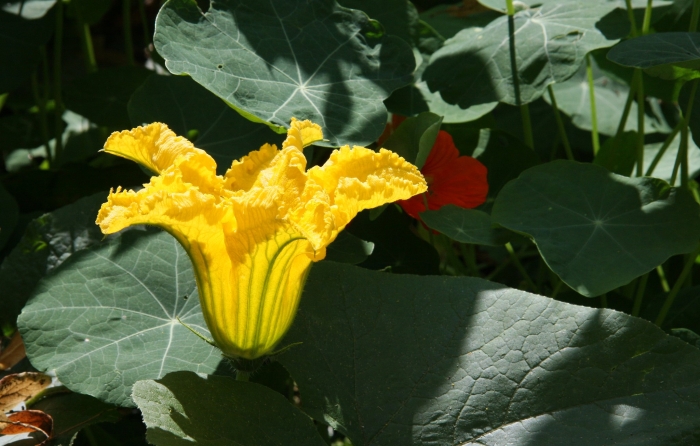Winter Squash
(Cucurbita maxima)
Winter Squash (Cucurbita maxima)
/
/

Maja Dumat
CC BY 2.0
Image By:
Maja Dumat
Recorded By:
Copyright:
CC BY 2.0
Copyright Notice:
Photo by: Maja Dumat | License Type: CC BY 2.0 | License URL: https://creativecommons.org/licenses/by/2.0 | Uploader: RoRo | Publisher: Wikimedia Commons |


























































































Estimated Native Range
Summary
Cucurbita maxima, commonly known as Winter Squash, is an annual vine or herb native to South America. It is one of the most diverse domesticated species within the genus Cucurbita, which includes several other cultivated squashes. Winter Squash typically sprawls or climbs with large, lobed leaves and thick, fleshy stems. It produces showy, yellow to orange flowers during the summer months, which are followed by a variety of fruit shapes and sizes, often with a tough rind that allows for long-term storage.
Winter Squash, including popular cultivars like Buttercup Squash, is highly valued for its edible fruit, which can be roasted, baked, or pureed into soups. The fruit’s versatility extends to sweet and savory dishes alike, making it a staple in cuisines worldwide. In cultivation, it requires full sun and consistent moisture for optimal growth, and it thrives in a wide range of well-drained soil types. While it is not particularly prone to diseases, common issues include squash vine borers and powdery mildew. Gardeners often use trellising to support the vines and improve air circulation around the plants. Due to its sprawling habit, it is commonly grown in home vegetable gardens where space allows.CC BY-SA 4.0
Winter Squash, including popular cultivars like Buttercup Squash, is highly valued for its edible fruit, which can be roasted, baked, or pureed into soups. The fruit’s versatility extends to sweet and savory dishes alike, making it a staple in cuisines worldwide. In cultivation, it requires full sun and consistent moisture for optimal growth, and it thrives in a wide range of well-drained soil types. While it is not particularly prone to diseases, common issues include squash vine borers and powdery mildew. Gardeners often use trellising to support the vines and improve air circulation around the plants. Due to its sprawling habit, it is commonly grown in home vegetable gardens where space allows.CC BY-SA 4.0
Plant Description
- Plant Type: Vine, Herb
- Height: 0.8-1.5 feet
- Width: 10-12 feet
- Growth Rate: Rapid
- Flower Color: Yellow
- Flowering Season: Summer
- Leaf Retention:
Growth Requirements
- Sun: Full Sun
- Water: Medium
- Drainage: Slow, Medium, Fast
Common Uses
Bee Garden, Bird Garden, Butterfly Garden, Drought Tolerant, Edible*Disclaimer: Easyscape's listed plant edibility is for informational use. Always verify the safety and proper identification of any plant before consumption., Hummingbird Garden, Rabbit Resistant, Showy Flowers
Other Names
Common Names: Great Pumpkin, Red Gourd, Pumpkin, Squash, Autumn Squash, Marrow, Pumpkin, Squash, Winter Squash, Turban Gourd
Scientific Names: , Cucurbita maxima, Cucurbita maxima var. turbaniformis, Cucurbita maxima var. triloba, Cucurbita maxima var. zipinka, Cucurbita maxima var. maxima, Cucurbita maxima var. turgida,
GBIF Accepted Name: Cucurbita maxima Duchesne